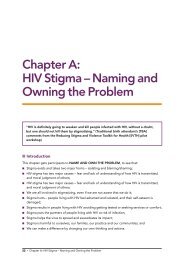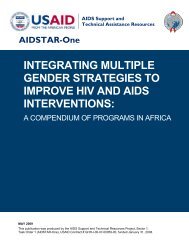Guide for Community Assessments on Women's Health Care - ICRW
Guide for Community Assessments on Women's Health Care - ICRW
Guide for Community Assessments on Women's Health Care - ICRW
You also want an ePaper? Increase the reach of your titles
YUMPU automatically turns print PDFs into web optimized ePapers that Google loves.
Keep Objectives in Mind<br />
As the facilitator, your job is to keep the discussi<strong>on</strong> and process in line with the workshop’s<br />
objectives. What in<str<strong>on</strong>g>for</str<strong>on</strong>g>mati<strong>on</strong> are you looking <str<strong>on</strong>g>for</str<strong>on</strong>g>? Why? What is important to know, and what is not<br />
very useful? If the discussi<strong>on</strong> does not go according to plan, think about the purpose and outcomes<br />
of the exercise to determine how to ensure you get the in<str<strong>on</strong>g>for</str<strong>on</strong>g>mati<strong>on</strong> you need.<br />
Verify and Compare In<str<strong>on</strong>g>for</str<strong>on</strong>g>mati<strong>on</strong>: <str<strong>on</strong>g>Community</str<strong>on</strong>g> assessment workshops are designed to obtain<br />
in<str<strong>on</strong>g>for</str<strong>on</strong>g>mati<strong>on</strong> from different sources: HIV-positive women, untested women, health care service<br />
providers and community leaders. One of your tasks as facilitator is to cross-check and compare<br />
this in<str<strong>on</strong>g>for</str<strong>on</strong>g>mati<strong>on</strong>. For example, if you get incomplete or c<strong>on</strong>fusing in<str<strong>on</strong>g>for</str<strong>on</strong>g>mati<strong>on</strong> from <strong>on</strong>e group of<br />
participants, ask the same questi<strong>on</strong> to a different group and compare their views. You will also have<br />
an opportunity to bring together all four groups to examine what they agree <strong>on</strong>.<br />
Clarify the Meaning of Key Words: It is important to ensure that you and participants are using<br />
the same language. You may assume that you share a comm<strong>on</strong> understanding of a term, but later<br />
discover that they understood it differently.<br />
Find Ways to Equalize Participati<strong>on</strong><br />
In some workshops you will find a few dominant participants. For example, women may say little and<br />
instead defer to male participants to speak <str<strong>on</strong>g>for</str<strong>on</strong>g> them.<br />
Follow these principles to involve every<strong>on</strong>e in the group:<br />
●●<br />
●●<br />
●●<br />
●●<br />
Establish ground rules that promote every<strong>on</strong>e’s participati<strong>on</strong>.<br />
Direct questi<strong>on</strong>s to the quieter participants and encourage them to c<strong>on</strong>tribute.<br />
Divide into pairs or small groups to get every<strong>on</strong>e talking.<br />
Go around the circle getting <strong>on</strong>e point from each pers<strong>on</strong>.<br />
Handle Sensitive Issues<br />
Be prepared to manage sensitive issues, especially when talking about sexual and reproductive<br />
health. In many societies, talking in public about topics related to sex is taboo.<br />
Part of the skill in managing these issues is to build an atmosphere of openness. The body mapping<br />
exercise is particularly effective in getting people to talk about sensitive issues.<br />
Facilitators should prepare be<str<strong>on</strong>g>for</str<strong>on</strong>g>ehand. You may be uncom<str<strong>on</strong>g>for</str<strong>on</strong>g>table talking about sexual body<br />
parts and their functi<strong>on</strong>s, or issues such as rape, child abuse, aborti<strong>on</strong> or female genital cutting.<br />
If you will facilitate these discussi<strong>on</strong>s, you need to be able to discuss these issues without feeling<br />
uncom<str<strong>on</strong>g>for</str<strong>on</strong>g>table. Practice ahead of time with other team members.<br />
While the workshop’s goal is to explore issues, be careful not to expose or isolate participants, or<br />
proceed into discussi<strong>on</strong>s bey<strong>on</strong>d the scope of the workshop. To manage sensitive issues, facilitators<br />
should:<br />
●●<br />
●●<br />
●●<br />
Get as much in<str<strong>on</strong>g>for</str<strong>on</strong>g>mati<strong>on</strong> as possible be<str<strong>on</strong>g>for</str<strong>on</strong>g>ehand <strong>on</strong> potentially sensitive areas and work out<br />
strategies to bring out these issues and handle them well.<br />
Include facilitators who are from the community and more attuned to sensitive issues. Work<br />
closely with local partners who understand the culture and can lead the discussi<strong>on</strong> around<br />
these issues.<br />
Observe the group’s body language to determine whether to explore an issue and or back off.<br />
People who d<strong>on</strong>’t want to discuss something may avoid eye c<strong>on</strong>tact or cross their arms.<br />
68 Chapter D: Tips <str<strong>on</strong>g>for</str<strong>on</strong>g> Running Participatory Workshops

















